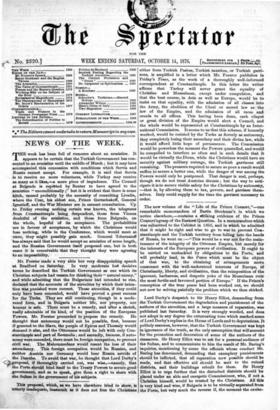Mr. Forster made a very able but very disappointing speech
at Bradford on Saturday. In very moderate but decisive terms he described the Turkish Government as one which its Christian subjects had reason for thinking their "natural enemy," -and while admitting that the Bulgarians had intended to rise, declared that the accounts of the atrocities by which their inten- tion was punished were correct. Those atrocities, if they could only have been concealed, would have proved a great success for the Turks. They are still continuing, though in a mode- rated form, and in Bulgaria neither life, nor property, nor honour is safe. There must be a remedy, and after a sketch, really admirable of its kind, of the position of the European Powers, Mr. Forster proceeded to propose the remedy. He thought that autonomy would not be possible, first, because if granted to the Slays, the people of Epirus and Thessaly would demand it also, and the Ottomans would be left with only Con- stantinople and part of Roumelia ; and secondly, because, if auto- nomy were conceded, there must be foreign occupation, to prevent -civil war. The Mahommedans would resent the loss of their ascendancy. This foreign occupation would be Russian, and neither Austria nor Germany would bear Russia astride of the Danube. To avoid that war, he thought that Lord Derby's proposal, if thoroughly carried out, was wise,—namely, that '0 the Porte should bind itself to the Treaty Powers to secure good government, and so to speak, give them a right to share with the Sultan in the government of his subjects.


































